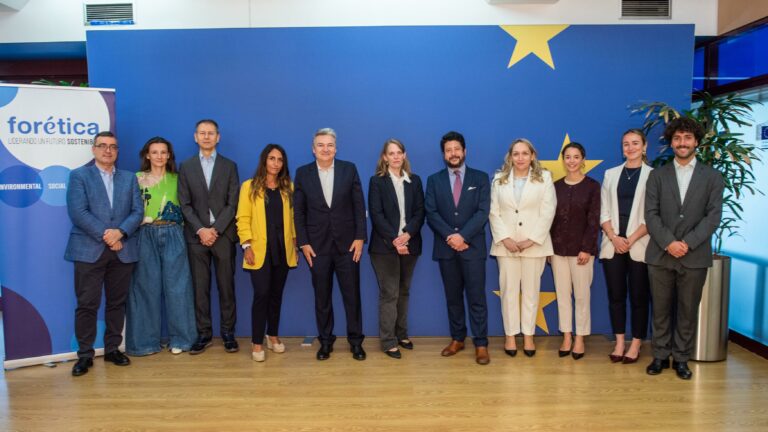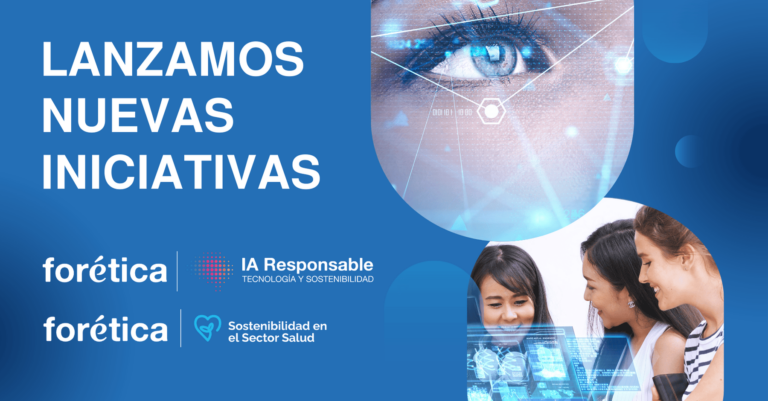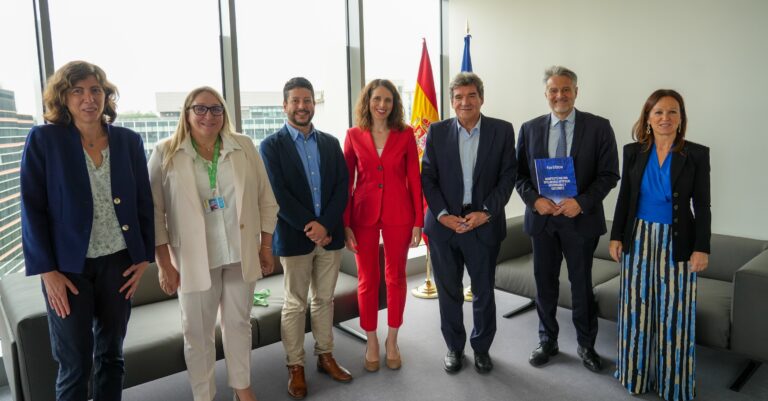In the era of sustainability and digital transformation, we must lead the way to a future where Artificial Intelligence (AI) generates positive impact on the planet, people and society.
Forética proposes five principles1and concrete specifications that companies and organizations should consider as a guide on their path toward responsible and sustainable IA:
PRINCIPLE 1
Align the development and/or use of AI systems systems and their components2 with the achievement of net-zero greenhouse gas (GHG) emissions3 targets.
AI energy consumption will be reduced by incorporating environmental sensitivity into data processing, model selection and training, or computational resource selection. Organizations will be kept up to date on environmental sustainability best practices in the development, deployment and use of AI so that it is aligned with the company's Net Zero strategy.
GHG emissions associated with AI will be reduced by using renewable energy, embedded low-emission hardware or software and hardware services that already ensure minimization or neutrality of GHG emissions.
1. These principles are aligned with the commitments proposed by the Spanish Business Council for Sustainable Development as well as with the United Nations Guiding Principles on Business and Human Rights, the European Commission's Ethical Guidelines for Trustworthy AI, the Charter of Fundamental Rights of the European Union and the definition of AI and the risk classification set out in the EU AI Act.
Refers to AI systems as defined in the European Union's Artificial Intelligence Regulation (Regulation (EU) 2024/1689) and including in its components, models, tools and data (including data for training, validation and testing) that are designed, developed, collected, acquired, reused or otherwise obtained for use in connection with Artificial Intelligence.
3: Net-Zero is related to the Paris Agreement of the 2015 Climate Summit (COP21) in which 196 countries agreed to reduce their emissions to limit the increase of the planet's temperature to 1, 5º above the pre-industrial average. To this end, it is necessary to reduce GHG emissions and the goal is to achieve net zero emissions by 2050.


PRINCIPLE 2
Align the development and/or use of AI systems and components with nature restoration objectives.
The hardware and software resources or services used by the AI will reduce water consumption, water and soil pollution, as well as solid waste generation.
PRINCIPLE 3
Promote that the development, deployment and/or use of AI systems and components is ethical, lawful, transparent, accurate, robust, secure and respectful of the UN Guiding Principles on Business and Human Rights, the Ethical Guidelines for Trustworthy AI and the Charter of Fundamental Rights of the European Union.
AI systems that interact with individuals will prioritize being designed, implemented and deployed in such a way that they know they are interacting with AI regardless of their level of risk.
Visibility of information management and documentation (interpretability) will be ensured, maximizing explainability, and allowing a clear understanding of the use and results obtained or decisions made by the use of AI.
Robustness and accuracy consistent with the results obtained or decisions made by the use of AI will be the norm*.
AI systems shall protect the security and privacy of both data and individuals, use data (capture, collection permission, processing or creation) lawfully, responsibly and in accordance with sound governance and management practices.
AI systems and their components shall be developed and deployed taking into account ethics and rights of use (intellectual property) and shall be appropriate for the context of use (suitability).
AI systems will have the necessary levels of accuracy, robustness, and cybersecurity, maintaining them throughout their lifecycle*.
It will invest in a workforce trained in the responsible use of AI and prepared for the future by developing and acquiring new knowledge and skills in responsible AI.
The corporate culture will encourage responsible use of AI at all levels of the organization.
The generation of alliances and knowledge spaces among organizations and for society on the responsible use of AI will be promoted.
In no case shall AI systems that correspond to prohibited AI practices** be developed, deployed and/or used.
**As defined in the EU Artificial Intelligence Regulation.


PRINCIPLE 4
Integrate in the development and/or use of AI systems the contribution to inclusion, equity, diversity and the elimination of any form of discrimination.
- Companies will assess the impact of the use of AI on different stakeholders and promote that AI systems and components are accessible and inclusive for all people, including the most vulnerable groups.
AI will generate explainable and bias-free results by relying on inclusive and diverse teams to mitigate the potential for unfair bias, unconscious discrimination or other unintended negative consequences.
PRINCIPLE 5
Deploy and use AI systems in accordance with principles of good governance and mindful of the responsibilities it entails
Existing internal governance, data governance and risk management structures will be aligned to mitigate AI risks across the organization*.
Responsible AI and data use practices will be adopted to uphold accountability, auditability, traceability, and ongoing compliance and performance monitoring of AI systems*.
AI systems will enable effective monitoring and control by people in their deployment and use*.
*For high-risk AI at a minimum.

SUPPORTING ORGANIZATIONS
By supporting this Manifesto, we reaffirm our commitment to Artificial Intelligence that is respectful of people, society and the planet and is well governed. With this in mind, and adapted to the context of each organization and sector, we will work on the development and continuous improvement of corporate policies to support these principles and transform them into action.



















































































